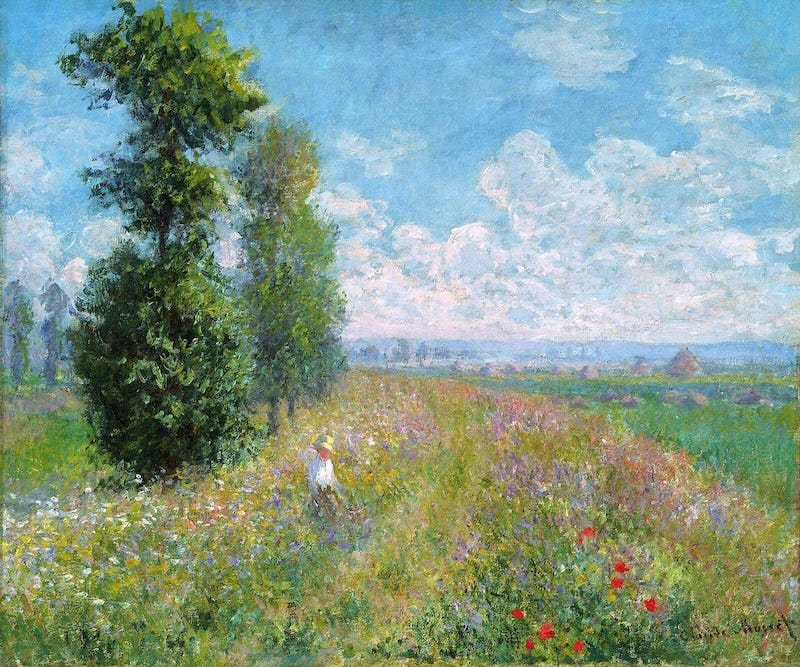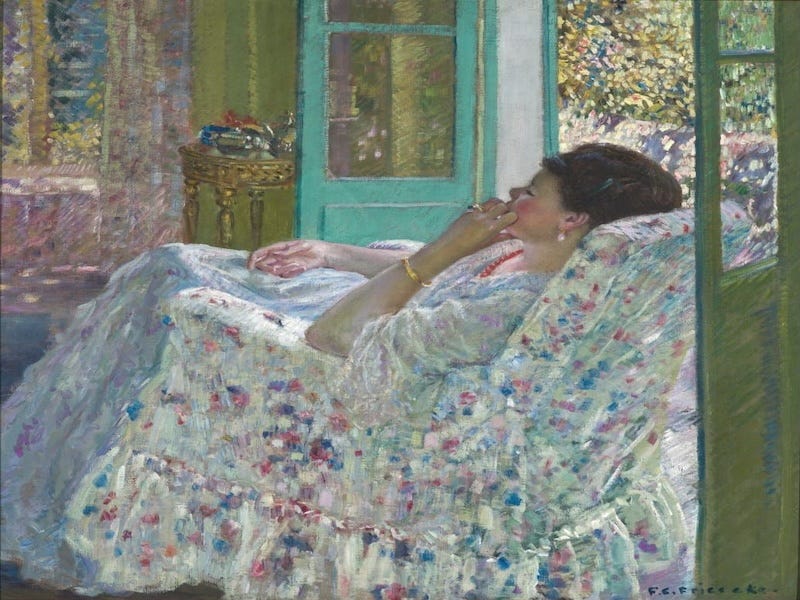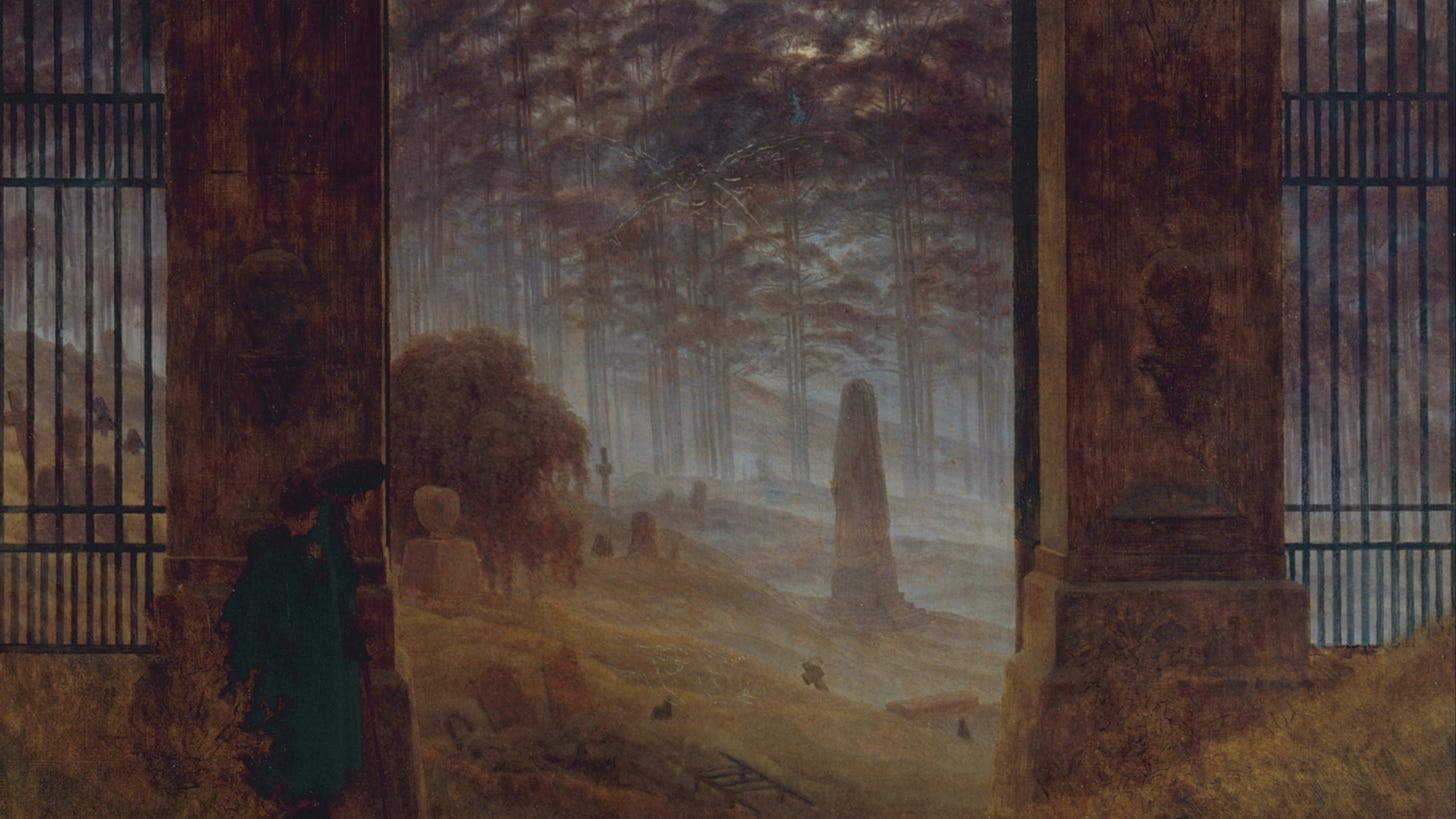Feb 25: Quiet Day
Everybody on mute: why more people are retreating to their quiet places, and where they go.
🥰 I would love, love, love it if you could help me spread the word about The Spiritual Almanac. Thank you so much!
Feb 25: Today is Quiet Day
A happy life must be to a great extent a quiet life, for it is only in an atmosphere of quiet that true joy dare live.
—Bertrand Russell
It’s loud out there. From leaf blowers, car horns, and construction noises to the constant chatter on Zoom calls, our world is constantly buzzing.
Maybe that’s why, during her performance of the song Energy from the Renaissance tour, Beyoncé surprised concert-goers with a moment of silence.
As she sings, “Look around, everybody on mute,” her backup performers and everyone in the crowd freeze in silence like a Simon Says game.
The muting challenge has spread across social media, helping people stop and consider the importance of silence in a loud world.
But what is it about silence that seems to draw us in? And why are more and more people retreating to their quiet places?
The Silence Trend
According to the World Health Organization, excessive noise is one of the top environmental hazards affecting public health.
Meditation apps, mindfulness practices, and even silent retreats are trending because of the need for a quiet place. It gives our minds a break from the constant stream of information and allows us to rest and recharge.
But beyond just a trend, studies show moments of silence can benefit our health and well-being. According to a study published in Heart, just two minutes of silence can lower blood pressure and improve overall cardiovascular health.
Silence reduces stress, increases focus and productivity, and even boosts creativity. It gives our brains a break from constant stimulation and allows us to recharge and refocus.
As a result, more and more people seek refuge in quiet places for comfort and protection in uncertain times.
Monasticism
The quest for silence is not new. Ancient Greek and Roman philosophers recognized noise as a significant distraction, challenging their ability to concentrate.
The Stoic philosopher Seneca expressed irritation at the distracting “babel” from a bathhouse below his writing room and withdrew to the countryside for quiet.
In the 4th century, Christianity saw a rise in monasticism, where monks sought solitude and silence to deepen their spiritual practice.
In Eastern traditions such as Buddhism and Hinduism, practitioners have long practiced silent meditation to achieve enlightenment and inner peace. The goal is to quiet the constantly chattering mind and connect with one’s true self.
Throughout history, countless individuals have recognized the profound impact of seeking quietude. Here are some places they go.
The Countryside
“I lived in solitude in the country and noticed how the monotony of a quiet life stimulates the creative mind.” —Albert Einstein
Albert Einstein, one of the greatest scientific minds in human history, was known for his significant contributions to physics. In addition to his revolutionary contributions to relativity and quantum mechanics, Einstein appreciated being alone and living a peaceful life.
While staying at the Tokyo Imperial Hotel in 1922, Einstein wrote a note on the hotel’s stationery instead of a tip to a courier. The note, written in German, stated, “A quiet and modest life brings more joy than a pursuit of success bound with constant unrest.”
He told the courier the note might someday be more valuable than a regular tip if he was lucky. That note sold at an auction in Jerusalem for $1.56 million in 2017!
A Woman’s Room
“A woman must have money and a room of her own if she is to write fiction.”
—Virginia Woolf
Virginia Woolf, a prominent English writer and one of the foremost modernists of the 20th century, earned a reputation for her deep reflections on life and literature. Her writings and lifestyle reflect her desire for a quiet life.
She often visited her aunt Caroline, the “Quaker,” at her home, known as “The Porch,” which she described as “an ideal retreat for me.” Here, her aunt taught her to listen to her “inner voice” and escape the patriarchic hold that sought to squelch her voice.
When she spoke of a “room of her own,” she wasn’t just referring to a physical space, but also the mental space a writer needs to create. For Woolf, the quiet and solitude offered by a personal space was essential for nurturing creativity and producing meaningful work.
Your Soul
“Nowhere can man find a quieter or more untroubled retreat than in his own soul.”
—Marcus Aurelius
Marcus Aurelius, known as the Philosopher Emperor, was a stoic who found solace within his soul during the turmoil of his life.
During the Marcomannic Wars, Aurelius led the Roman Empire through one of its most challenging periods.
Despite the stress and challenges, he turned inward for strength and guidance. He maintained a series of personal writings, now known as the “Meditations,” where he reflected on his thoughts and philosophies.
One entry reads, “You have power over your mind - not outside events. Realize this, and you will find strength.”
His ability to retreat inwards allowed him to lead with wisdom and equanimity, demonstrating the power of internal peace and resilience.
Your Breath
"You don't need a lot of modern gadgets in order to be civilized. You need only a small bell, a quiet space, and your mindful in-breath and out-breath."
—Thích Nhất Hạnh
During a retreat in Plum Village, France, a visitor asked renowned Vietnamese Zen master Thích Nhất Hạnh how to find peace amidst the chaos of daily life. He smiled and invited the person for tea.
As they sat in silence, Hạnh gently rang a small bell before taking a mindful sip of tea. The tranquility struck the visitor, and a presence emanated from this simple act.
At that moment, surrounded by nothing but the sound of the bell and their shared breaths, a quiet place emerged from within and out.
The Cemetery
“The cemetery is my sense of comfort, my sanctuary in a world of darkness, the one piece of light that I have in my life. “
—Jessica Sorensen
Many people find solace in cemeteries. These peaceful places offer a sense of stillness and contemplation. Some even use them for quiet walks or to sit and reflect.
Famous poet and philosopher Rainer Maria Rilke often sought inspiration in cemeteries and wrote about the importance of solitude in his work. He once said, "The only journey is the one within."
In the quietness of cemeteries, we glimpse both mortality and eternity and perhaps, like Rilke, find inspiration in the stillness of these hallowed grounds.
This Week’s Inspiration: Find Your Quiet Place
Here are some ideas to help you discover your own quiet place this week:
Nature Retreat: Consider spending time in a park, garden, or by a lake to connect with the calming presence of nature.
Meditation Corner: Create a cozy spot in your home with cushions, candles, and soothing music for a peaceful meditation practice.
Reading Nook: Set up a comfortable chair with good lighting where you can escape into a book and unwind.
Digital Detox Zone: Designate an area free from screens and distractions to unplug and focus on being present.
Outdoor Sanctuary: Explore local trails or scenic spots for a quiet walk or hike to clear your mind and rejuvenate.
Do you have a quiet place? Is it a cozy corner in your home, a serene natural spot, or perhaps a peaceful public space?
Please share where you find peace and tranquility. Your story could inspire someone else to find their own quiet place. Let’s all “look around, and everybody go mute.”
Clicking the 💚 heart button is like a virtual hug and helps more people discover this publication. Thank you!
Want to read more about finding your quiet place? Here are some publications you may enjoy.
“Silence is a source of great strength.” —Lao Tzu









Thank you for this piece, Mary! It's inspiring, intriguing and also useful in a practical sense. I find my most important quiet space in daily pre-dawn walks through the high-desert prairie around my house, where I am immersed in the community of the land. It's never silent--there is the sound of the wind, the chuckling of robins and chortling of ravens, coyotes' "singing" from distant ridges, and the human sounds as people head off in their cars to begin the work day. But those sounds are woven together in a way that helps me find my inner silence, and does not get in the way.
I loved this post - a beautiful hymn to silence.
In Charles Lamb's essay about the Quakers, he wrote:
"Dost thou love silence deep as that “before the winds were made?” go not out into the wilderness, descend not into the profundities of the earth; shut not up thy casements; nor pour wax into the little cells of thy ears, with little-faith’d self-mistrusting Ulysses. — Retire with me into a Quaker’s Meeting. For a man to refrain even from good words, and to hold his peace, it is commendable; but for a multitude, it is great mastery."
I find a lot of meaning in this as someone who struggles in noisy environments. What I take from Lamb is his perception that we can find silence anywhere, including in the company of others. We don't need to go to the mountaintop or desert to encounter it. As I have spent most of my life in huge cities, that's a valuable insight.